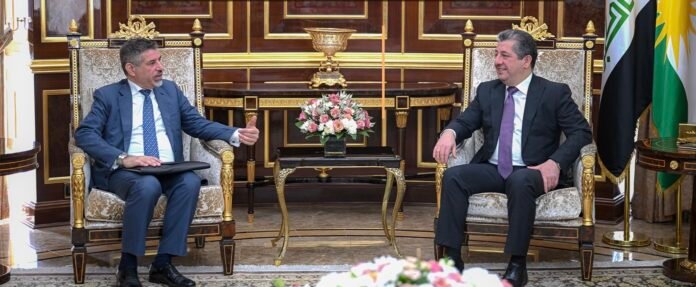Prime Minister Masrour Barzani met with U.S. Chargé d’Affaires Steven Fagin to address critical issues facing the Kurdistan Region. The two leaders agreed on the immediate need to secure salary payments, restart oil exports, and end drone attacks on vital infrastructure. Their joint stance sends a strong signal of urgency.
During their high-level meeting in Erbil, Barzani and Fagin emphasized that Baghdad must release overdue public sector salaries. The delay has caused hardship for thousands of families. Both parties agreed that the financial entitlements must be transferred without further postponement.
They also urged a quick restart of oil exports through the Turkish port of Ceyhan. Since March 2023, exports have been halted following an international court ruling in Baghdad’s favor. This disruption cut off the Kurdistan Region’s primary revenue stream. The leaders warned that further delays could deepen the region’s economic crisis.
The meeting also tackled growing security threats. Barzani and Fagin called for an end to repeated drone strikes on the region’s oil fields. These attacks, often blamed on Iran-backed militias, continue to damage energy facilities and destabilize the economy. The leaders stressed that energy infrastructure must be protected.
Another key point raised was the need to form a new Kurdistan Regional Government (KRG) cabinet. They agreed that this must happen before Iraq’s upcoming parliamentary elections. Political delays have held back reforms and weakened governance in the region.
Ambassador Fagin reaffirmed U.S. support for a stable and prosperous Kurdistan Region. He emphasized Washington’s commitment to preserving the region’s autonomy within a federal Iraq. Prime Minister Barzani, in return, thanked the U.S. for its consistent backing during times of political and financial strain.
The dispute over public sector salaries has long strained relations between Erbil and Baghdad. Budget disagreements and unclear revenue-sharing formulas have led to extended payment delays. This has affected hundreds of thousands of government workers and caused widespread public dissatisfaction.
The oil export issue remains unresolved. With no steady flow since last year, the KRG faces significant revenue shortfalls. Officials have warned that without oil income, the region cannot meet its basic financial obligations.
Meanwhile, drone attacks continue to raise fears about regional stability. Energy sites are frequent targets, threatening investment and development. Protecting these facilities is essential for long-term economic recovery.
The outcome of meeting underscores a clear message: action must follow words. The region needs financial relief, oil exports must resume, and drone threats must end. Only then can the people of Kurdistan look ahead with hope.

